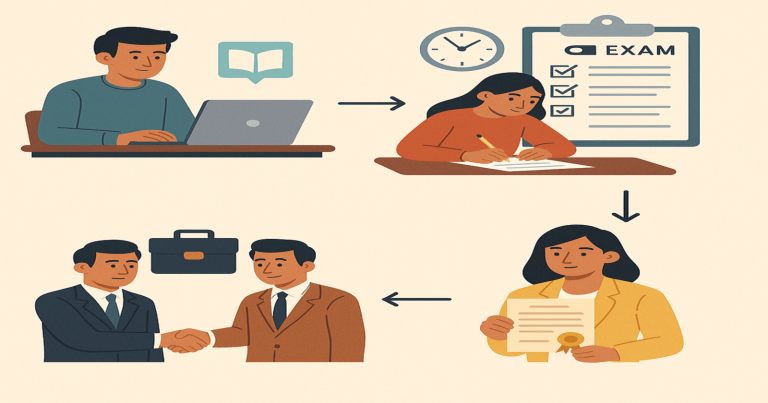Many students and finance professionals ask how to become CFA in India because they want to grow in investment and financial careers. CFA, or Chartered Financial Analyst, is a global certification offered by the CFA Institute, USA. This course teaches you how to analyze companies, manage portfolios, and follow ethical finance practices. If you want to work in investment banking, portfolio management, or equity research, becoming a CFA can help you build a strong future.
So, how to become a CFA in India? You need to clear three levels of exams – Level 1, Level 2, and Level 3. You also need four years of work experience in finance-related jobs. After completing all levels and submitting your work proof, the CFA Institute will give you the CFA charter. This title shows that you are trained and certified in international investment standards.
In India, thousands of students from commerce, engineering, MBA, and even science backgrounds pursue CFA along with jobs or other studies. You can start this course after graduation or even in the final year of your bachelor’s degree.
Who Can Become a CFA in India?
Before starting the CFA course, you must check whether you meet the entry requirements. The CFA Institute sets basic CFA eligibility rules for candidates from India and other countries. Let’s understand who can apply and what documents you need.
Educational Qualification
You must have one of the following:
- A bachelor’s degree in any stream (BCom, BBA, BA, BSc, BE, or others)
- Or, be in the final year of your graduation at the time of CFA Level 1 registration
- Or, have a combination of four years of professional work experience and/or higher education
This means you don’t need to be a finance student to apply. Even engineers and science students can become CFA if they are interested in investment careers.
Age and ID Proof
You must have a valid international travel passport. This is required for exam registration and entry into the exam centre. There is no age limit, but most candidates are between 20–35 years.
Language Requirement
The entire CFA program is in English. You must be able to read, understand, and answer finance questions in English. There is no separate English test, but comfort in reading large textbooks is important.
How to Become CFA in India
To know how to become CFA in India, you must understand all the steps involved in the journey. The CFA course is divided into three exam levels and a work experience requirement. Here’s how to proceed.
Step 1: Check Eligibility and Create CFA Institute Account
First, you must create an account on the CFA Institute’s official website (www.cfainstitute.org). Fill in your personal details and educational background, and submit valid ID proof. Make sure your name matches the one in your passport.
Once your account is ready, you can register for CFA Level 1. Choose your exam window, test city, and preferred date.
Step 2: Register for CFA Level 1 Exam
CFA exams are now computer-based. You can take Level 1 in February, May, August, or November. Registration opens six months before the exam date. The early fee is around USD 940, and the late fee is around USD 1,250. You must also pay a one-time enrollment fee of USD 350 for Level 1.
Choose a nearby test city from the available CFA exam centres in India and schedule your exam.
Step 3: Prepare and Pass CFA Level 1
Level 1 tests your basic knowledge of finance, economics, accounting, and ethics. The exam has 180 multiple-choice questions, split across two sessions.
Most students study for 300–350 hours to prepare for Level 1. You can use CFA Institute’s online books or join coaching like Plutus Education or Fintree. Solve practice questions and mock exams to build speed and confidence.
Step 4: Register and Clear CFA Level 2
After passing Level 1, register for Level 2. This level tests your ability to apply concepts. It uses item-set questions (case studies followed by MCQs). Focus more on financial analysis, valuation, and portfolio concepts.
Again, study for 300–350 hours and practice mock exams regularly.
Step 5: Register and Pass CFA Level 3
Level 3 is the final exam. It tests your portfolio management and wealth planning skills. It has essay-style questions (constructed response) and item sets.
After clearing Level 3, you must gather work experience to become a CFA charterholder.
Step 6: Gain Work Experience and Apply for CFA Charter
You must complete 4,000 hours (about 4 years) of work experience in finance or investment-related roles. This can be full-time, part-time, or a mix.
Then, submit your experience, get it verified, and apply for CFA membership. Once approved, you will receive your CFA charter.
CFA Exam Structure — Levels and Topics
The CFA exam structure is known for its depth, difficulty, and focus on real-world finance skills. It is divided into three progressive levels, each testing different knowledge areas and skills. Understanding the structure is key for effective preparation and time management. Here’s a detailed look at the levels and topics covered in the CFA journey.
CFA Level 1 Exam
The CFA Level 1 exam focuses on basic knowledge of investment tools, ethical standards, and financial concepts. It tests your understanding through 180 multiple-choice questions divided into two sessions.
- Question Type: Multiple-choice (180 questions)
- Topics Covered:
- Ethics
- Financial Reporting
- Quantitative Methods
- Economics
- Corporate Finance
- Fixed Income
- Equity
- Derivatives
- Portfolio Management
- Alternative Investments
- Ethics
This level builds your foundation. You should focus on remembering formulas and concepts.
CFA Level 2 Exam
The CFA Level 2 exam emphasizes applying investment tools and concepts to real-world scenarios. It features 88 item set questions based on case studies, testing deeper analytical skills.
- Question Type: Item sets (case-based MCQs)
- Topics Covered: Same as Level 1 but in more detail
- Focus: Application and analysis
You will learn to apply theories and tools to solve real-world problems. Practice is key here.
CFA Level 3 Exam
The CFA Level 3 exam focuses on portfolio management and wealth planning, emphasizing practical application and decision-making. It includes constructed response (essay-type) questions and item sets based on case studies.
- Question Type: Constructed response + item sets
- Topics Covered:
- Portfolio Management
- Wealth Planning
- Ethics
- Risk Management
- Performance Evaluation
- Portfolio Management
This level teaches you to think like a portfolio manager. Focus on writing clear answers.
CFA Fees in India
Understanding the CFA fees in India is important for planning your certification journey wisely. The CFA program involves multiple costs, including registration and exam fees at each level. These charges can vary based on when you register and the exchange rate. The cost of becoming a CFA includes exam fees, books, and coaching (if needed). Let’s see the full expense.
| Item | Cost (USD) | Approx INR (₹) |
| One-time enrollment fee | $350 | ₹29,000 |
| CFA Level 1 registration | $940 (early) | ₹78,000 |
| CFA Level 2 registration | $940 (early) | ₹78,000 |
| CFA Level 3 registration | $940 (early) | ₹78,000 |
| Total (excluding coaching) | $3,170 | ₹2.6 lakhs |
If you add coaching or mock tests, the total cost may go up to ₹3–3.5 lakhs.
CFA Study Tips for Indian Students
Indian students often prepare for the CFA alongside college or work. So you must follow a plan that saves time and keeps you focused.
Make a Study Timetable
Divide your topics week-wise. Study for 2 hours on weekdays and 5 hours on weekends. Keep the last 30 days for full revision and mock tests.
Use the Right Material
Use official CFA books, Schweser notes, or FinShiksha courses. Don’t use outdated PDFs. Study from the current syllabus only.
Join a Coaching If Needed
Join coaching like Plutus Academy, EduPristine, or Fintree if you need expert guidance. Online classes also help if you can’t attend in-person.
CFA Career Opportunities in India
After you complete the CFA course, you can work in many finance roles. Indian companies and global firms value the CFA designation highly.
Common Job Roles After CFA
- Equity Research Analyst
- Credit Analyst
- Investment Banker
- Portfolio Manager
- Wealth Advisor
- Financial Analyst
- Risk Manager
Top firms like JP Morgan, Goldman Sachs, BlackRock, Morgan Stanley, Deloitte, and ICICI hire CFA charterholders.
How to Become CFA in India FAQs
1. Can I do CFA after 12th?
No. You can start the CFA course in the final year of your graduation. You need a bachelor’s degree or 4 years of work/study experience.
2. Is CFA better than MBA?
CFA is better for core finance roles like investment analysis and portfolio management. MBA is broader and covers management skills. CFA is cheaper and globally accepted.
3. Can I do CFA with a full-time job?
Yes. Many Indian students clear CFA while working. You need to plan well and study regularly. CFA coaching can help working professionals manage time.
4. How long does it take to become CFA?
It takes about 2.5 to 4 years to complete all levels and gain work experience. Some finish faster if they pass all levels on the first attempt.
5. Is CFA recognized in India?
Yes. CFA is globally accepted. In India, top banks, AMCs, consulting firms, and NBFCs prefer CFA-qualified candidates for finance roles.


